China–United Kingdom relations
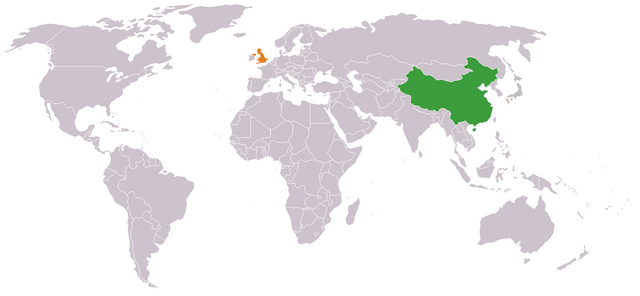
China–United Kingdom relations

China | United Kingdom |
|---|---|
| Diplomatic mission | |
| Embassy of China, London | Embassy of the United Kingdom, Beijing |
| Envoy | |
| Ambassador Liu Xiaoming | Ambassador Barbara Woodward |
Chinese-United Kingdom relations (simplified Chinese: 中英关系; traditional Chinese: 中英關係; pinyin: Zhōng-Yīng guānxì), more commonly known as British–Chinese relations, Anglo-Chinese relations and Sino-British relations, refers to the interstate relations between China (with its various governments through history) and the United Kingdom. The United Kingdom and China were on opposing sides of the Cold War. Both countries are permanent members of the United Nations Security Council.
China | United Kingdom |
|---|---|
| Diplomatic mission | |
| Embassy of China, London | Embassy of the United Kingdom, Beijing |
| Envoy | |
| Ambassador Liu Xiaoming | Ambassador Barbara Woodward |
Chronology
Medieval
Rabban Bar Sauma from China visited France and met with King Edward I of England in Gascony.
Between England and the Ming Dynasty (1368–1644)
English ships sailed to Macau in the 1620s, which was leased by China to Portugal. The Unicorn, an English merchant ship, sank near Macau and the Portuguese dredged up sakers (cannon) from the ships and sold those to China around 1620, where they were reproduced as Hongyipao.
27 June 1637: Four heavily armed ships under Captain John Wendell, arrived at Macao in an attempt to open trade between England and China. They were not backed by the East India Company, but rather by a private group led by Sir William Courteen, including King Charles I's personal interest of £10,000. They were opposed by the Portuguese authorities in Macao (as their agreements with China required) and quickly infuriated the Ming authorities. Later, in the summer, they easily captured one of the Bogue forts, and spend several weeks engaged in low-level fighting and smuggling. After being forced to seek Portuguese help in the release of three hostages, they left the Pearl River on 27 December. It is unclear whether they returned home.[1][2][3]
Great Britain and the Qing Dynasty (1644–1911)
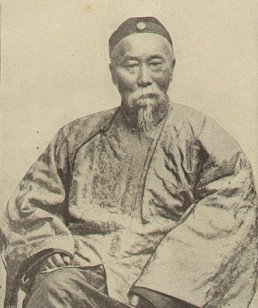
Skilled diplomat, Li Hongzhang acted as a negotiator between the West and the late Qing Dynasty. Queen Victoria made him a Knight Grand Cross of the Royal Victorian Order.
1685 Michael Shen Fu-Tsung visits Britain and meets James II.[4]
1793 George Macartney, 1st Earl Macartney led the Macartney Embassy to Beijing
1816 William Pitt Amherst, 1st Earl Amherst led the Amherst Embassy to China.
ca. 1820-1830 - British merchants turn Lintin Island in the Pearl River estuary into a centre of opium trade.[5][6]
1839-42 First Opium War 1841 - Convention of Chuenpi, intended to end the war and to cede Hong Kong Island to the British, signed, but never ratified 29 August 1842 - Treaty of Nanking ends the war. It includes the cession of Hong Kong Island to the British, and opening of five treaty ports to international trade[7] October 1843 - Treaty of the Bogue supplements Treaty of Nanking by granting extraterritoriality to British subjects in China and most favored nation status to Britain
1856-60 Second Opium War June 1858 - The Treaty of Tientsin is signed by Lord Elgin October 1860 - the sack and destruction of the Old Summer Palace by the victorious British and French troops October 1860 - Convention of Peking ends the war. Kowloon Peninsula is ceded to Britain
26 March 1861 - In accordance with the treaties, a British Legation opens in Beijing (Peking). In the following few years consulates open throughout the Empire, including Hankou (Wuhan), Takao (Kaohsiung), Tamsui (near Taipei), Shanghai and Xiamen.
1868 - The Yangzhou riot.
1875 - The Margary Affair.
1877 - A Chinese Legation opens in London under Guo Songtao (Kuo Sung-t'ao)
1877-1881 - Britain advises on the Ili Crisis.
1886 - After Britain took over Burma, they maintained the sending of tribute to China, putting themselves in a lower status than in their previous relations.[8] It was agreed in the Burmah convention in 1886, that China would recognise Britain's occupation of Upper Burmah while Britain continued the Burmese payment of tribute every ten years to Beijing.[9]
1888 - War in Sikkim between the British and Tibetans. By the Treaty of Calcutta (1890), China recognises British suzerainty over northern Sikkim.
17 March 1890 Convention Between Great Britain and China relating to Sikkim & Tibet, fixes the border between Sikkim and Tibet.[10]
1896 - Sun Yat-sen is detained in the Chinese Legation in London. Under pressure from the British public, the Foreign Office secures his release.
9 June 1898 - Convention for the Extension of Hong Kong Territory (Second Convention of Peking): New Territories are leased to Britain for 99 years, and are incorporated in Hong Kong
1898 - The British obtain a lease on Weihai Harbour, Shandong, to run for as long as the Russians lease Port Arthur. (The reference to the Russians was replaced with one to the Japanese after 1905). An incident occurred where Mail-steamers arrived in Shanghai and dropped off "four young English girls" in December 1898.[11][12][13][14]
1900-1901 - The Boxer Rebellion
1901 - The Boxer Protocol
1906 - Anglo-Chinese Treaty on Tibet, which London interprets as limiting China to suzerainty over the region
1909 - The Japanese Government claims foreign consulates in Taiwan; the British consulates at Tamsui and Takoa close the following year.
Britain and the Republic of China (1912–present)
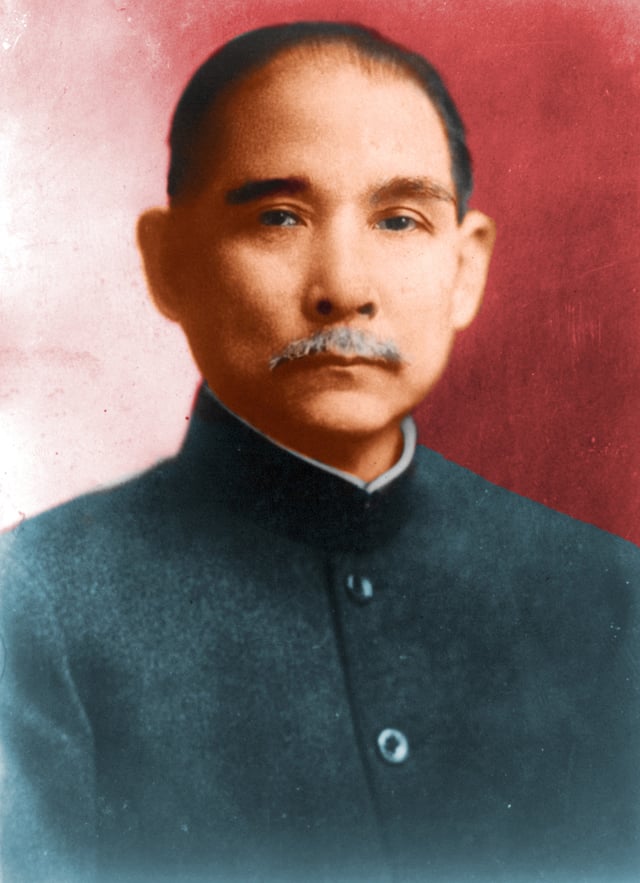
British diplomats rescued Sun Yat-sen from their Qing counterparts in 1896. Sun later founded the Republic of China.
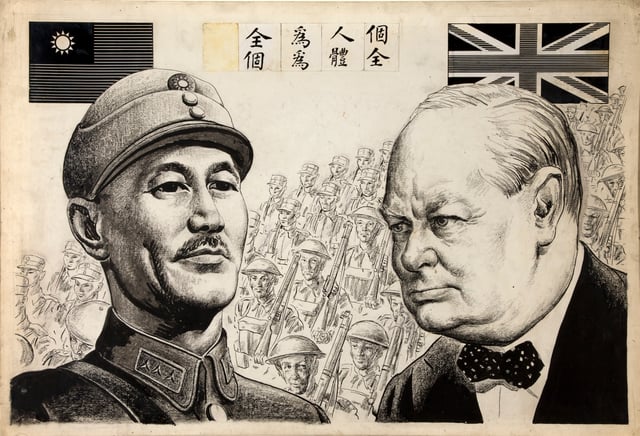
Chiang-Kai-Shek and Winston Churchill heads, with Nationalist China flag and Union Jack.
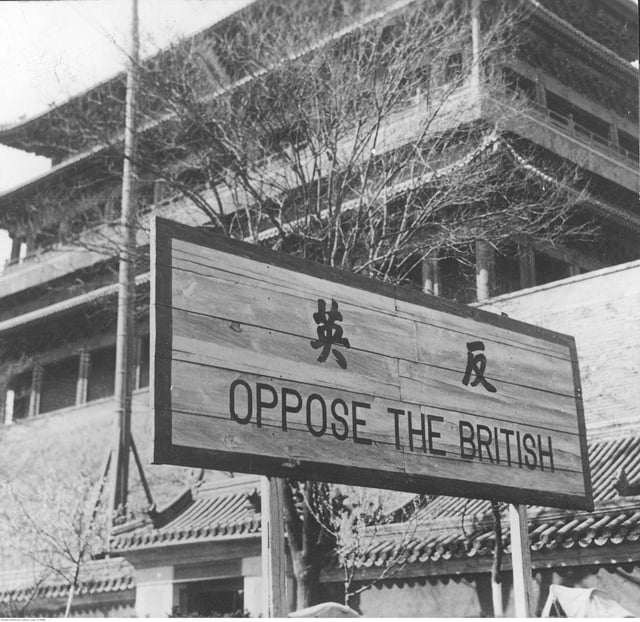
A sign displayed in Japanese-occupied Beijing in May 1940
1916 - The Chinese Labour Corps recruits Chinese labourers to aid the British during World War I.
14 August 1917 - China joins Britain as part of the Allies of World War I.
4 May 1919 - The anti-imperialist May Fourth Movement begins in response to the Beiyang government's failure to secure a share of the victory spoils from the leading Allied Powers, after Britain sides with its treaty ally Japan on the Shandong Problem. From this point the ROC leadership moves away from Western models and towards the Soviet Union.
November 1921-February 1922. At the Washington naval disarmament conference rivalries persisted over China. The United States, Japan and Britain supported different warlords. The US and Britain were hostile to the nationalists revolutionary government in Guangzhou (Canton) and supported Chen Jiongming's rebellion. Chinese reactions led to the Northern Expedition (1926-27).[15]
30 May 1925 - Shanghai Municipal Police officers under British leadership kill nine people while trying to defend a police station from Chinese protesters, provoking the anti-British campaign known as the May 30 Movement.
19 February 1927 - Following riots on the streets of Hankow (Wuhan) the Chen-O'Malley Agreement is entered into providing for the hand over of the British Concession area to the Chinese authorities.
1930 - Weihai Harbour returned to China.
17 May 1935 - Following decades of Chinese complaints about the low rank of Western diplomats, the British Legation in Beijing is upgraded to an Embassy.[16]
1936-37 - British Embassy moves to Nanjing (Nanking), following the earlier transfer there of the Chinese capital.
1937-41 - British public and official opinion favours China in its war against Japan, but Britain focuses on defending Singapore and the Empire and can give little help. It does provide training in India for Chinese infantry divisions, and air bases in India used by the Americans to fly supplies and warplanes to China.[17]
1941-45 - Chinese and British fight side by side against Japan in World War II. The British train Chinese troops in India and use them in the Burma campaign.
6 January 1950 - His Majesty's Government (HMG) removes recognition from the Republic of China. The Nanjing Embassy is then wound down. The Tamsui Consulate is kept open under the guise of liaison with the Taiwan Provincial Government.
13 March 1972 - The Tamsui Consulate is closed.[18]
February 1976 - The Anglo Taiwan Trade Committee is formed to promote trade between Britain and Taiwan.[19]
30 June 1980 - Fort San Domingo is seized by the Republic of China authorities in lieu of unpaid rent.[18]
1989 - The Anglo Taiwan Trade Committee begins issuing British visas in Taipei.
1993 - British Trade and Cultural Office opened in Taipei.[20]
Between the UK and the People's Republic of China (1949–present)
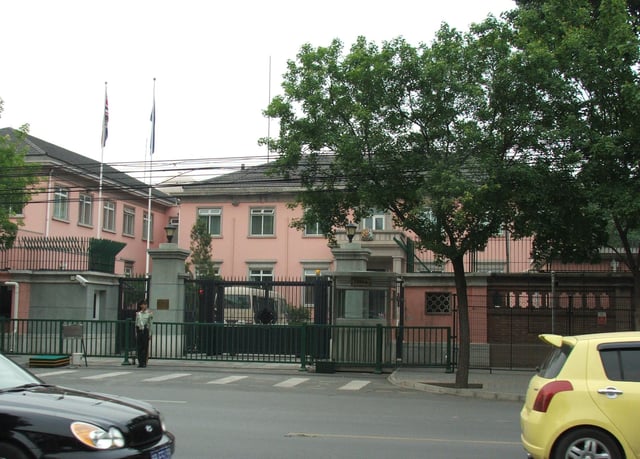
The British Embassy in Beijing
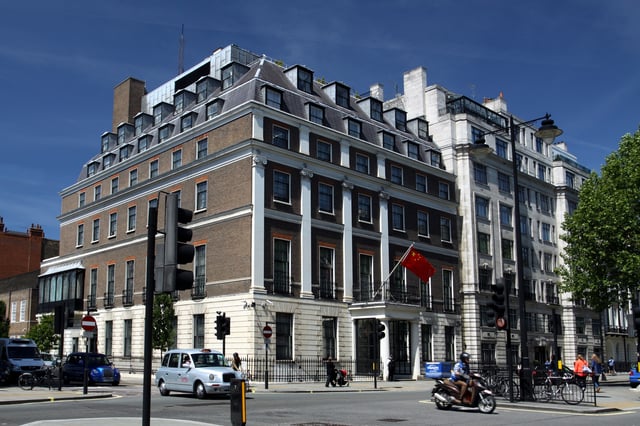
Chinese Embassy in London
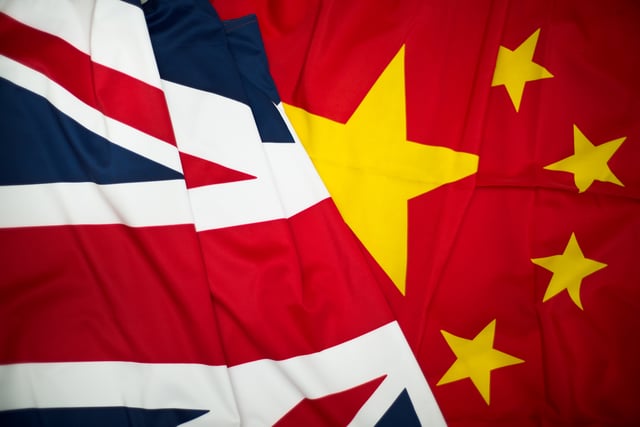
British and Chinese Flags together.
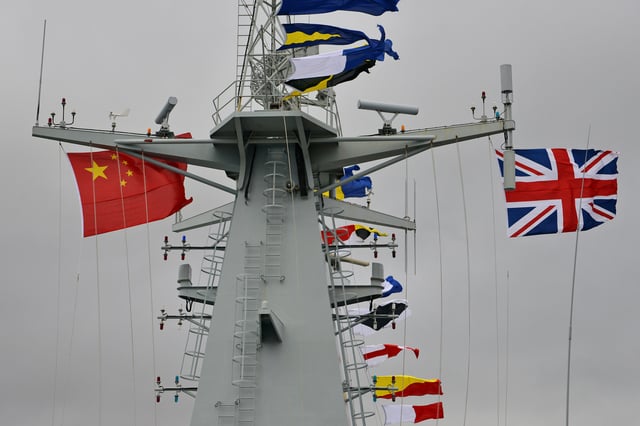
Union Flag flies from the PLAN ship Changbai Shan during a visit to Portsmouth in 2015
The United Kingdom and the anti-Communist Nationalist Chinese government were allies during World War II. Britain sought stability in China after the war to protect its more than £300 million in investments, much more than from the United States. It agreed in the Moscow Agreement of 1945 to not interfere in Chinese affairs but sympathised with the Nationalists, who until 1947 were winning the Chinese Civil War against the Communist Party of China.[21]
By August 1948, however, the Communists' victories caused the British government to begin preparing for a Communist takeover of the country. It kept open consulates in Communist-controlled areas and rejected the Nationalists' requests that British citizens assist in the defence of Shanghai. By December, the government concluded that although British property in China would likely be nationalised, British traders would benefit in the long run from a stable, industrialising Communist China. Retaining Hong Kong was especially important; although the Communists promised to not interfere with its rule, Britain reinforced the Hong Kong Garrison during 1949. When the victorious Communist government declared on 1 October 1949 that it would exchange diplomats with any country that ended relations with the Nationalists, Britain—after discussions with other Commonwealth members and European countries—formally recognised the People's Republic of China in January 1950.[21]
20 April 1949 - The People's Liberation Army attacks HMS Amethyst (F116) travelling to the British Embassy in Nanjing in the Amethyst incident. The Chinese Communists do not recognise the Unequal treaties and protest the ship's right to sail on the Yangtze.[22]
6 January 1950 - The United Kingdom recognises the PRC as the government of China and posts a chargé d'affaires ad interim in Beijing (Peking). The British expect a rapid exchange of Ambassadors. However, the PRC demands concessions on the Chinese seat at the UN and the foreign assets of the Republic of China.
c.1950 - British companies seeking trade with the PRC form the Group of 48 (now China-Britain Business Council).[16][23]
1950 - British Commonwealth Forces in Korea successfully defend Hill 282 against Chinese and North Korean forces in the Battle of Pakchon, part of the Korean War.
1950 - The Chinese People's Volunteer Army defeat U.N forces, including the British at the Battle of Chosin Reservoir, part of the Korean War
1951 - Chinese forces clash with U.N forces including the British at the Imjin River.
1951 - Chinese forces attacking outnumbered British Commonwealth forces are held back in the Battle of Kapyong.
1951 - British Commonwealth forces successfully capture Hill 317 from Chinese forces in the Battle of Maryang San.
1953 - Outnumbered British forces successfully defend Yong Dong against Chinese forces in the Battle of the Hook.
1954 - The Sino-British Trade Committee formed as semi-official trade body (later merged with the Group of 48).
1954 - A British Labour Party delegation including Clement Attlee visits China at the invitation of then Foreign Minister Zhou Enlai.[24]
17 June 1954 - Following talks at the Geneva Conference, the PRC agrees to station a chargé d'affaires in London. The same talks resulted in an agreement to re-open a British office in Shanghai, and the grant of exit visas to several British businessmen confined to the mainland since 1951.[25]
1961 - The UK begins to vote in the General Assembly for PRC membership of the United Nations. It has abstained on votes since 1950.[26]
June 1967 - Red Guards break into the British Legation in Beijing and assault three diplomats and a secretary. The PRC authorities refuse to condemn the action. British officials in Shanghai were attacked in a separate incident, as the PRC authorities attempted to close the office there.[27]
June–August 1967 - Hong Kong 1967 riots. The commander of the Guangzhou Military Region, Huang Yongsheng, secretly suggests invading Hong Kong, but his plan is vetoed by Zhou Enlai.[28]
July 1967 - Hong Kong 1967 riots - Chinese People's Liberation Army troops fire on British Hong Kong Police, killing 5 of them.
23 August 1967 - A Red Guard mob sacks the British Legation in Beijing, slightly injuring the chargé d'affaires and other staff, in response to British arrests of Communist agents in Hong Kong. A Reuters correspondent, Anthony Grey, was also imprisoned by the PRC authorities.[29]
29 August 1967 - Armed Chinese diplomats attack British police guarding the Chinese Legation in London.[30]
13 March 1972 - PRC accords full recognition to the UK government, permitting the exchange of ambassadors. The UK acknowledges the PRC's position on Taiwan without accepting it.[31]
1982 - During negotiations with Margaret Thatcher about the return of Hong Kong, Deng Xiaoping tells her that China can simply invade Hong Kong. It is revealed later (2007) that such plans indeed existed.[28]
1984 - Sino-British Joint Declaration.
12–18 October 1986 - Queen Elizabeth II makes a state visit to the PRC, becoming the first British monarch to visit China.[32]
30 June-1 July 1997 - Transfer of sovereignty over Hong Kong from United Kingdom to China.
1997 - China and Britain forge a strategic partnership.[33][34]
24 August 2008 - Olympic flag is handed over from the Beijing mayor Guo Jinlong to London mayor Boris Johnson, for the 2012 Summer Olympics in London.
29 October 2008 - The UK recognises Tibet as an integral part of the PRC. It had previously only recognised Chinese suzerainty over the region.[35]
26 June 2010 - Chinese President Hu Jintao invites British Prime Minister David Cameron for talks in Beijing.[36]
5 July 2010 - Both countries pledge closer military cooperation.[34][37]
25 November 2010 - senior military officials meet in Beijing to discuss military cooperation.
26 June 2011 - Chinese Premier Wen Jiabao visits London in order to plan out trade between the two countries which is worth billions of pounds.[38]
October 2013 - Britain's chancellor George Osborne visits China to look at making new trade links. He says that the UK and China have "much in common" in a speech during his visit.[39]
June 2014 - Chinese Premier Li Keqiang and his wife Cheng Hong visit UK and meet with Queen Elizabeth II and British Prime Minister David Cameron.[40][41]
2015 - UK becomes one of the founder members of the Chinese-led Asian Infrastructure Investment Bank (AIIB) [42]
20–23 October 2015 - Chinese President Xi Jinping and First Lady Peng Liyuan undertake a state visit to the United Kingdom, visiting London and Manchester, and meeting with Queen Elizabeth II and David Cameron. More than £30 billion worth of trade deals are also signed on this state visit.[43][44][45][[INLINE_IMAGE|//upload.wikimedia.org/wikipedia/commons/thumb/d/d3/Hong_Kon_IMG_20190830_205041_%2848648185963%29.jpg/220px-Hong_Kon_IMG_20190830_205041_%2848648185963%29.jpg|//upload.wikimedia.org/wikipedia/commons/thumb/d/d3/Hong_Kon_IMG_20190830_205041_%2848648185963%29.jpg/330px-Hong_Kon_IMG_20190830_205041_%2848648185963%29.jpg 1.5x, //upload.wikimedia.org/wikipedia/commons/thumb/d/d3/Hong_Kon_IMG_20190830_205041_%2848648185963%29.jpg/440px-Hong_Kon_IMG_20190830_205041_%2848648185963%29.jpg 2x||h165|w220|thumbimage]] British government backed the anti-government demonstrators in the 2019 Hong Kong protests[46]
July 2016 - China and the UK start a £1.3 million collaboration project on sustainable agricultural technology research, marking the latest addition to farming cooperation between the two countries.[47]
March 2017 - To mark the occasion of the 45th anniversary of the establishment of diplomatic relations, China Plus, together with Renmin University, invites experts and researchers from China and the UK to discuss the future of bilateral relations.[48]
February 2018 - British Prime Minister Theresa May visits China on a three-day trade mission and meets with Chinese President Xi Jinping, continuing the so-called "Golden Era" of Sino-British relations.[49]
July 2019 - the UN ambassadors from 22 nations, including UK, signed a joint letter to the UNHRC condemning China’s mistreatment of the Uyghurs as well as its mistreatment of other minority groups, urging the Chinese government to close the Xinjiang re-education camps.[50][51]
July 2019 - British Prime Minister Boris Johnson said his government will be very "pro-China". Johnson voiced support for President Xi Jinping's infrastructure investment effort Belt and Road Initiative and promised to keep Britain "the most open economy in Europe" for Chinese investments.[52]
Diplomacy
Common memberships
|
|
Transport
Air Transport
All three major Chinese airlines, Air China, China Eastern & China Southern fly between the UK and China, principally between London-Heathrow and the three major air hubs of Beijing, Shanghai and Guangzhou. China Southern also flies between Heathrow and Wuhan. Among China's other airlines; Hainan Airlines flies between Manchester and Beijing, Beijing Capital Airlines offers Heathrow to Qingdao, while Tianjin Airlines offers flights between Tianjin, Chongqing and Xi'an to London-Gatwick. Hong Kong's flag carrier Cathay Pacific also flies between Hong Kong to Heathrow, Gatwick and Manchester. The British flag carrier British Airways flies to just three destinations in China; Beijing, Shanghai and Hong Kong, and in the past Chengdu. Rival Virgin Atlantic flies between Heathrow to Shanghai and Hong Kong. British Airways has mentioned that it is interested in leasing China's new Comac C919 in its pool of aircraft of Boeing and Airbus.[56]
Rail Transport
In January 2017, China Railways and DB Cargo launched the Yiwu-London Railway Line connecting the city of Yiwu and the London borough of Barking, and creating the longest railway freight line in the world. Hong Kong's MTR runs the London's TfL Rail service and has a 30% stake in South Western Railway. In 2017, train manufacturer CRRC won a contract to build 71 engineering wagons for London Underground. This is the first time a Chinese manufacturer has won a railway contract.[57]
Culture & Media
Both countries are major cultural powerhouses. Although the UK is more established in this regard than China, the latter is an emerging cultural superpower. Much of the lack of cultural links between the two nations is due to differences in language and local restrictions. A strong exception exists for Hong Kong due to the region's former links with the UK as a crown colony.
Press
The weekly-published Europe edition of China Daily is available in a few newsagents in the UK, and on occasions a condensed version called China Watch is published in the Daily Telegraph.[58] The monthly NewsChina,[59] the North American English-language edition of China Newsweek (中国新闻周刊) is available in a few branches of WHSmith. Due to local censorship, British newspapers and magazines are not widely available in Mainland China, however the Economist and Financial Times are available in Hong Kong.
British "China Hands" like Carrie Gracie, Isabel Hilton and Martin Jacques occasionally write opinion pieces in many British newspapers and political magazines about China, often to try and explain about Middle Kingdom.
Radio and Television
Like the press, China has a limited scope in the broadcasting arena. In radio, the international broadcaster China Radio International broadcasts in English over shortwave which isn't widely taken up and also on the internet. The BBC World Service is available in China by shortwave as well, although it is often jammed (See Radio jamming in China). In Hong Kong, the BBC World Service is relayed for eight hours overnight on RTHK Radio 4 which on a domestic FM broadcast.
On television, China broadcasts both its two main English-language news channels CGTN and CNC World. CGTN is available as a streaming channel on Freeview, while both are available on Sky satellite TV and IPTV channels. Mandarin-speaking Phoenix CNE TV is also available of Sky satellite TV. Other TV channels including CCTV-4, CCTV-13, CGTN Documentary,& TVB Europe are available as IPTV channels using set-top boxes.
British television isn't available in China at all, as foreign televisions channels and networks are not allowed to be broadcast in China. On the other hand, there is an interest in British television shows such as Sherlock and British television formats like Britain's Got Talent (China's Got Talent, 中国达人秀) & Pop Idol (Super Girl, 超级女声).
British in China
Statesmen
Sir Robert Hart was an Scots-Irish statesman who served the Chinese Imperial Government as Inspector General of Maritime Customs from 1863 to 1907.
George Ernest Morrison resident correspondent of The Times, London, at Peking in 1897, and political adviser to the President of China from 1912 to 1920.
Diplomats
Sir Thomas Wade - first professor of Chinese at Cambridge University
Herbert Giles - second professor of Chinese at Cambridge University
Harry Parkes
Sir Claude MacDonald
Sir Ernest Satow served as Minister in China, 1900-06.
John Newell Jordan[60] followed Satow
Sir Christopher Hum
Augustus Raymond Margary
Merchants
Lancelot Dent
Keswick family
William Jardine
Military
Charles George Gordon
Missionaries
Robert Morrison
Hudson Taylor
Griffith John
Cambridge Seven
Eric Liddell
Gladys Aylward
Academics
Frederick W. Baller
James Legge (first professor of Chinese at the University of Oxford)
Joseph Needham
Jonathan Spence
Chinese statesmen
Li Hongzhang
Zhang Zhidong
See also
Foreign relations of the United Kingdom
History of foreign relations of China
Foreign relations of Imperial China
China Policy Institute University of Nottingham Ningbo, China
Foreign relations of the Republic of China (from 1911 ... ) Foreign relations of the People's Republic of China (after 1949) Foreign relations of the Republic of China ( ... to today)
British Chinese (Chinese people in the UK)
Sustainable Agriculture Innovation Network (between the UK and China)